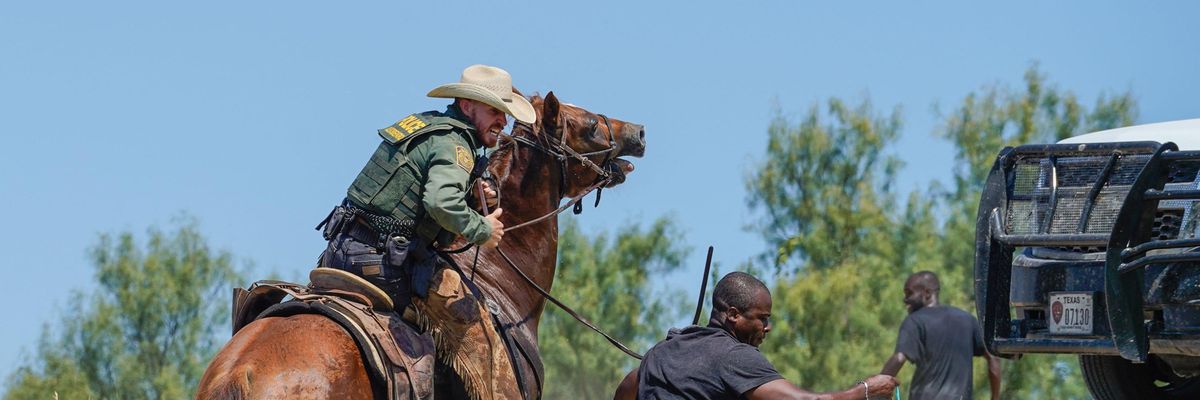Ghastly images and videos this week showed Border Patrol agents on horses, using their reins aggressively to intimidate Haitians, including small children, on the riverbank in Del Rio, Texas.
Unfortunately, any observer of Border Patrol can tell you that its mistreatment of migrants is far from an isolated incident. Such cruelty warrants a congressional investigation--not only into the specific actions in Del Rio but, more importantly, into systemic problems within Border Patrol that allow such abusive conduct with seeming impunity.
Border Patrol's long record of failure to confront wrongdoing within its ranks is what perpetuates recurring abuses.
The Department of Homeland Security has promised an investigation and deployed oversight personnel on site in Del Rio "full-time." But that announcement came only after Homeland Security Secretary Alejandro Mayorkas initially brushed off reports of agents' actions, accusing reporters of "assuming facts that have not yet been determined."
There is little reason to have confidence in the department's willingness to hold its agents accountable, given unfulfilled past pledges to investigate Border Patrol abuses. Those inquiries have most often resulted in zero accountability and frequently disappear from sight without public resolution.
This pattern has been true regardless of the administration: During the Obama years, children in Mexico were shot dead by agents without any acknowledgment of wrongdoing, and Border Patrol was
singled out as "America's most out-of-control law enforcement agency." Donald Trump's Border Patrol notoriously separated families at the border, and Customs and Border Protection was accused of obstructing a House investigation into a racist and sexist Facebook group involving large numbers of current and former personnel.
Reports on internal investigations based on CBP's own records found that it took no action in 96% of 1,255 cases of alleged Border Patrol misconduct between January 2012 and October 2015.
Based on this abysmal track record, Congress should be skeptical of any DHS internal review and conduct an independent investigation of Border Patrol's Del Rio disgrace. The department has consistently failed to punish civil rights abuses or, worse, is unwilling to do so. Even its staff doesn't trust the culture. A 2019 inspector general report found that 47% of CBP employees surveyed at the nation's largest law enforcement agency did not believe officials at all levels were held accountable for their conduct.
Major accountability-first reforms must transform Homeland Security, including the proper use of body-worn cameras, which CBP announced six weeks ago (but no border agent apparently wore in Del Rio). Until then, the Biden administration should assign the Department of Justice to lead in investigating and punishing Homeland Security civil rights violations.
According to CALFIRE, 2020 was the largest wildfire season in California's modern history, with 4.1 million acres set ablaze. Now, in 2021, we are in the middle of the third driest year on record with water restrictions likely to come later this...
Accountability efforts should also avoid another familiar CBP smokescreen: blaming a few "bad apples," training flaws or policy gaps to mitigate agents' inexcusable violence. No doubt there are lots of agents who behave professionally and deplore misconduct, but that is despite a toxic culture that has shown again and again that it valorizes brutality over human rights in controlling the border.
When the Border Patrol's tactical unit deployed to Portland in 2020 and was infamously recorded spiriting a protester away in an unmarked van, Americans experienced the Border Patrol's reputation for brutality that dates to the 1920s. CBP's own former deputy assistant commissioner for internal affairs has described a widespread self-perception by agents that they are "members of a 'paramilitary organization' and soldiers 'on the front line' of a war against criminal organizations and terrorism." He said "many agents asserted that CBP's mission was to protect the border at all costs, even at the expense of human life."
Aside from prompt, transparent investigation and discipline of agents involved, Border Patrol leadership at all levels must be held to account as well. Border Patrol Chief Raul Ortiz's decision to deploy agents on horseback led directly to the confrontations with migrant families. The Biden administration appointed Ortiz without explaining how a 29-year veteran of the Border Patrol could be a needed change agent for a deeply flawed and entrenched culture. Indeed, before taking office, Ortiz said he did not plan to make any drastic changes.
It shouldn't be a surprise, then, that--despite his new role as head of the Border Patrol, responsible for setting accountability standards--Ortiz reflexively defended the agents he had recently led as chief of the Del Rio sector. He claimed their actions were most likely just an attempt to control the horses.
Border Patrol's long record of failure to confront wrongdoing within its ranks is what perpetuates recurring abuses. No one should be taken in by the Homeland Security crisis-management playbook. Unless Congress investigates Border Patrol and forces reforms, we will get yet another whitewash.

